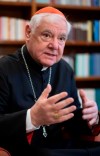Archbishop of Winnipeg recalls Pope Benedict as a shy, gentle man
Advertisement
Read this article for free:
or
Already have an account? Log in here »
To continue reading, please subscribe:
Monthly Digital Subscription
$0 for the first 4 weeks*
- Enjoy unlimited reading on winnipegfreepress.com
- Read the E-Edition, our digital replica newspaper
- Access News Break, our award-winning app
- Play interactive puzzles
*No charge for 4 weeks then price increases to the regular rate of $19.00 plus GST every four weeks. Offer available to new and qualified returning subscribers only. Cancel any time.
Monthly Digital Subscription
$4.75/week*
- Enjoy unlimited reading on winnipegfreepress.com
- Read the E-Edition, our digital replica newspaper
- Access News Break, our award-winning app
- Play interactive puzzles
*Billed as $19 plus GST every four weeks. Cancel any time.
To continue reading, please subscribe:
Add Free Press access to your Brandon Sun subscription for only an additional
$1 for the first 4 weeks*
*Your next subscription payment will increase by $1.00 and you will be charged $16.99 plus GST for four weeks. After four weeks, your payment will increase to $23.99 plus GST every four weeks.
Read unlimited articles for free today:
or
Already have an account? Log in here »
Hey there, time traveller!
This article was published 05/01/2023 (1076 days ago), so information in it may no longer be current.
Pope Benedict XVI may have been popularly known as “God’s rottweiler” for his deep convictions and theological certitude, but Richard Gagnon, the archbishop of Winnipeg, remembers him as being shy, quiet, curious, thoughtful and gentle.
While archbishop of Victoria, Gagnon met Benedict, whose real name was Joseph Aloisius Ratzinger, in Rome.
“It was a remarkable encounter,” he said of the meeting at the pope’s summer residence. “He was a very gentle man.”
SASHA SEFTER / WINNIPEG FREE PRESS FILES
Of his legacy, the archbishop of Winnipeg Richard Gagnon said Pope Benedict XVI “has contributed much to the church as a theologian and a thinker. His contributions will last a very long time.”
During the meeting, Benedict produced a map and asked Gagnon to show him his diocese and tell him about the people there.
“He wanted to know about the people, especially about the Indigenous people in my diocese,” Gagnon said.
Gagnon recalls the encounter like speaking to a grandfather. “He had a lot of wisdom, he was very intelligent,” he said, adding the visit “is something I will always remember and treasure.”
Of his legacy, Gagnon said Benedict “has contributed much to the church as a theologian and a thinker. His contributions will last a very long time.”
In particular, Gagnon continues to be inspired by Benedict’s three-volume series on the life of Jesus. “You can really see his faith coming through that,” he said, adding his encyclicals were “masterpieces.”
Although his papacy was dogged by sex scandals in the church, Gagnon gives him credit for creating processes to start dealing with them and for taking it seriously by meeting with victims. He also praised Benedict for meeting with Indigenous leaders, including Phil Fontaine in 2009, his final year as National Chief of the Assembly of First Nations.
At that meeting Benedict expressed sorrow for the abuse and “deplorable” treatment many Indigenous people suffered at residential schools.
Although at the time he was criticized for not going far enough in pursuing reconciliation with Indigenous people, Gagnon said Benedict “paved the way” for what Pope Francis was able to do last year when he formally apologized on behalf of the Roman Catholic Church to Indigenous people in Canada.
Benedict got things started “and moved it along,” Gagnon said.
For Benedict, Gagnon added, the Christian life “was not about the church as an institution, or a series of ideas, but an encounter with the living Christ.”
SVEN HOPPE / DPA via THE ASSOCIATED PRESS FILES
Emeritus Pope Benedict XVI died Dec. 31, at age 95.
As for his reputation as a stern man, Gagnon said part of the reason was that he followed the charismatic John Paul II.
“That was a hard pope to follow,” he said, noting that Benedict “was not comfortable in the spotlight. But if you look more deeply, you will see he had a pastoral heart.”
In a statement, Albert LeGatt, archbishop of St. Boniface, recalled Benedict’s last words — “’Lord, I love you’” — saying that simple statement encapsulated his “whole soul.”
While it’s true that he was a great theologian who left behind many reflections on the Christian faith, LeGatt went on to say, “we should never forget that that all that reflection was animated by a personal encounter with Jesus, and by a desire to make the love of Christ shine in our contemporary world, with all its complexity.”
In particular, LeGatt said he remembers “his humility and courage” when he resigned as pope in 2013 and praised him for how he “contributed to continued dialogue with people of other spiritual traditions and, in Canada, to reconciliation with Indigenous people.”
faith@freepress.mb.ca
The Free Press is committed to covering faith in Manitoba. If you appreciate that coverage, help us do more! Your contribution of $10, $25 or more will allow us to deepen our reporting about faith in the province. Thanks! BECOME A FAITH JOURNALISM SUPPORTER

John Longhurst has been writing for Winnipeg's faith pages since 2003. He also writes for Religion News Service in the U.S., and blogs about the media, marketing and communications at Making the News.
Our newsroom depends on a growing audience of readers to power our journalism. If you are not a paid reader, please consider becoming a subscriber.
Our newsroom depends on its audience of readers to power our journalism. Thank you for your support.
The Free Press acknowledges the financial support it receives from members of the city’s faith community, which makes our coverage of religion possible.









